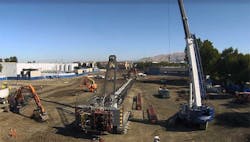STACK Infrastructure has lined up $325 million in low-cost debt to fund new construction, including a 32-megawatt data center in San Jose that has been fully pre-leased.
The STACK financing highlights how programmatic debt strategies are allowing data center developers to access affordable capital to build new data center capacity. The company’s use of securitized notes allowed to it borrow the $325 million at an interest rate of 1.893 percent, which STACK says is the lowest rate yet for the data center industry.
The money will help fund STACK development projects in eight markets across the country as the company accelerates its plan to deploy a national network of data centers. STACK has now raised $1.4 billion in three securitized debt offerings. STACK is one of several developers that have used securitization, a strategy which allows the company to borrow more efficiently.
“As the STACK platform has continued to scale, we’ve seen unprecedented levels of investor demand, which stands as a testament to the Company’s credible growth strategy and our ability to support the accelerated momentum of the hyperscale and cloud data center market,” said Heather Paduck, Chief Financial Officer. “We are committed to driving value for our clients above all else, and that partnership continues to fuel our success.”
Leasing Success in Silicon Valley
The strong appetite for data center capacity is clearly reflected in the pre-lease of the entire 32-megawatt second phase on the STACK campus in San Jose, which was announced in January. The STACK expansion continues the building boom in Silicon Valley data center market, which is seeing a surge in construction after a period of limited supply. Silicon Valley is one of the largest and most important data center markets in the U.S., providing space for servers to deploy new hardware and services from the region’s marquee technology companies, as well as a legion of fast-moving startups.
Significantly, several of the new construction have been fully pre-leased prior to completion, and STACK continues that trend. The company noted that the global pandemic is driving investor interest in data centers, as data demands are increasing to support work-from-home initiatives, collaboration tools, and new technology platforms. STACK is an industry leader in facilitating its clients to meet the increasing end-user demand.
In San Jose, STACK made space for its expansion by knocking down an existing structure and using a parking lot to create the footprint for a 240,000 square foot data center. The project is expected to come online in the third quarter of 2021.
STACK’s development pipeline spans the U.S. data center landscape. It includes:
- A 100% pre-leased 32MW multi-story data center on its campus in San Jose, California, currently under construction.
- A 125-acre hyperscale data center campus with 250MW of potential critical capacity in Prince William County, Virginia in partnership with the Peterson Companies.
- A 24MW, multi-story data center adjacent to its existing facility in Chicago, which will be ready for service in the second half of 2020.
- An 80+MW expansion of its Portland data center campus, which is currently under development.
- An 80-acre hyperscale campus in Phoenix, Arizona with access to over 150MW of critical capacity.
- A 400-acre hyperscale data center campus with 400MW potential critical capacity in AllianceTexas, a master-planned development in Fort Worth, Texas, in partnership with Hillwood.
- Acquisition of an existing data center in New Albany, Ohio, where its campus includes development land that has the potential to add an additional 32MW of capacity.
- Expansion in Atlanta, Georgia, bringing total capacity in that region to 20MW.
Programmatic Approach, Supported by Securitization
STACK Infrastructure was formed by investor IPI Data Center Partners with assets acquired from Infomart Data Centers and T5 Data Centers, giving it a national footprint spanning 1.5 million feet of space and 100 megawatts of capacity.
In a programmatic real estate venture, investors and a developer team up on a series of projects, usually targeting a strategic niche or product type. The arrangement provides a steady source of capital, focused development expertise, and a repeatable game plan for bringing new projects to market. In the data center industry, a programmatic or “platform” approach is common for companies like STACK that are seeking to build a network of facilities. This approach also can simplify the process of selling or refinancing properties or portfolios.
STACK can access cheap capital through its use of securitization financing, in which a company creates a security based on the creditworthiness of a specific pool of assets, rather than the entire company. Data center developers can issue debt notes backed by cash flow from operational data centers, which are leased by some of the world’s largest and most credit-worthy companies. That tenant credit quality enables the issuer to pay lower interest rates on its debt, which reduces its costs as it seeks to compete and build additional facilities.
About the Author


